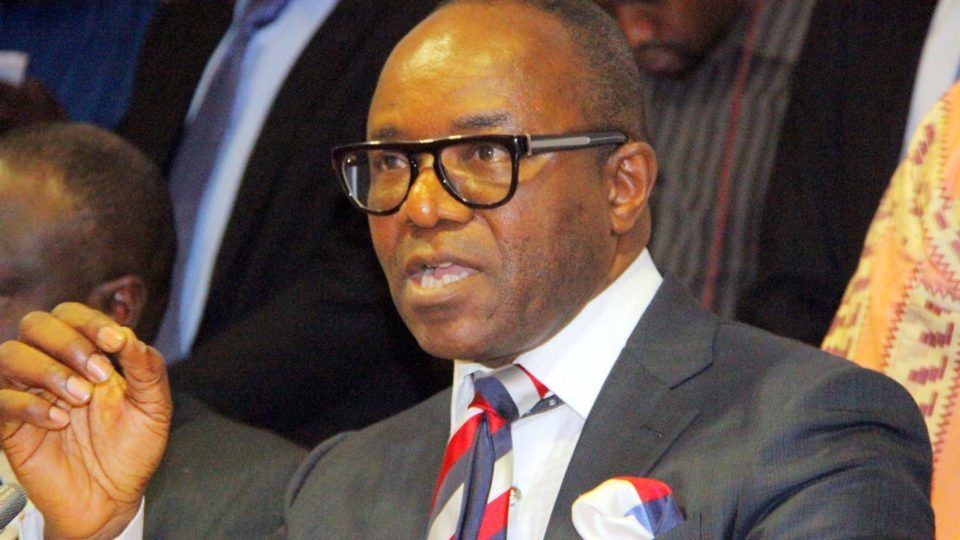
The Minister of State for Petroleum Resources, Dr Ibe Kachikwu and Group Managing Director of NNPC, Mr Maikanti Baru, have met and discussed opportunities to further develop the nation’s oil and gas sector.
They met in Abuja at the ongoing Nigerian Economic Summit at the Energy Policy Committee session.
Baru, who led a session, came first at the venue of the programme, while Kachikwu walked in some few minutes later.
As soon as the Minister of State entered, Baru stood up, approached him and exchanged pleasantries with him.
Kachikwu also suggested that he be represented at the second session of the dialogue by Baru, a request the organisers declined, because Baru was to chair a session as it would affect his participation.
Kachikwu left while the breakout held and did not return until the end of the closing session.
Baru stood in for him as the Chairman of the session, and when he returned, he joined as the co-chairman.
At the end of the programme, they exchanged pleasantries further, took some photographs, chatted and walked out of the hall together.
On the opportunities in the Nigerian oil and gas industry, Kachikwu said the industry had enormous potentials evolving on a daily basis.
He, however, said that the operating environment was tough, adding that the Federal Government was looking at areas it could provide incentives to boost returns for investors, to attract more investors into the industry.
He said that the Federal Government was putting in place modalities to increase the scope of its earnings in the industry.
He said that the environment was improving, adding that companies that had suspended their big projects were beginning to look at the potentials of reviving them.
Kachikwu further stated that the Federal Government was currently conducting a study to determine reasons why only nine marginal oil fields awarded were involved in production out of the 24 awarded over a decade ago.
He said that the essence of the investigation was to determine factors preventing the oil fields from producing.
This, he said, was designed also advance the Nigerian oil industry forward.
He said, “Financing is key. We are still yet to develop a model that enables local players’ access financing very easily.
“And in an environment where we do not have lot of reserves, it would be very tough.
“We are going to be looking at all kinds of guarantee platforms, whether there are money to be set aside over a shorter time period with lower interest rates, whether they are international communities that are ready to invest on basis of guaranteed returns of certain barrels.
“We are going to see how we would work to come up with a model that would help people. And that is going to come after we do a study.
“We are doing a study right now to find out why the 24 minus nine marginal fields are not producing oil, did not get to development. Let us be sure it is only financing. If it is more of technical skills, then I think we have got to address that differently.
“If it is more of financing, community development, or quarrels among shareholders, which is a major problem with these teams.
”A lot of funny bedfellows come together and once they finish, they spend the whole time quarrelling in court and nothing happens. We are going to look at all those.
Kachikwu assured that the forthcoming marginal oil field bid rounds would be transparent and would ensure that oil producing communities not just participate in the process, but also got the most advantage from the oil fields.
“Even when you do transparency, you have to have some level of inclusive or inclusion. How do you get some of these communities to participate? “
He further disclosed that the Ministry of Petroleum was developing models that would enable the President to choose what he wanted to do and how he wanted to go about the marginal fields’ bid round.
“The key issue is that it must be transparent, so that people could see before they go in, what is expected, how the government wants to run this and hopefully win on the basis of very well-defined goals.”
Kachikwu also called for a whittling down of the powers of the Minister of Petroleum Resources, in favour of a stronger industry regulator.
“One thing I can say for sure is that whatever models of the Petroleum Industry Bill we are pushing, we need to begin to see an independent regulator with fairly enormous powers and with less of a political interface, so that the individuals can do their work.
“I am all for whittling down substantially, the powers of the minister, so that these institutions can work well.
”The reality is that no one stays as a minister forever. It is something we are working on with the National Assembly.
We are still working to make the independence stronger,” he added.
Baru listed the opportunities in the forthcoming marginal oil fields bid round, adding that a successful completion of the process would present a veritable opportunity for Nigeria to grow its crude oil output and create employment.
